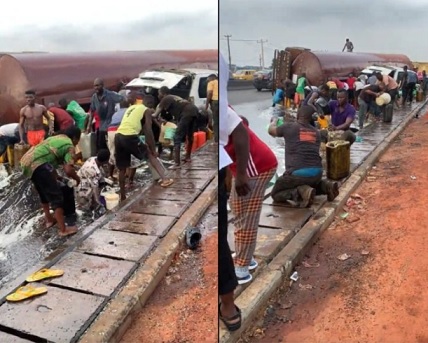
Many Lagosians threw caution to the wind and went to siphon fuel from a toppled tanker when a tanker carrying diesel fell and spilled its contents in the Otedola area of the Lagos-Ibadan Expressway.
The tanker reportedly collided with a white vehicle and toppled onto its side. As the contents of the trailer poured onto the street, residents immediately rushed out with containers to retrieve diesel for themselves. Some scooped from the roadside, while others climbed onto the fallen tanker to collect fuel from it.
With adrenaline rushing through their veins, the residents disregarded their safety and focused solely on obtaining the valuable diesel that escaped from the toppled tanker. In their desperation, they ignored the potential dangers of open flames, sparking cigarettes, or even the mere presence of a stray spark that could ignite the volatile fuel and turn the scene into a raging inferno.
Word about the incident spread like wildfire, attracting a growing crowd from nearby neighborhoods. Onlookers who initially came to witness the spectacle found themselves enticed by the opportunity to siphon fuel for their own personal gain. It became a chaotic scene as people jostled and shoved, each fighting for their fair share of the liquid treasure.
In the midst of the commotion, a few wise individuals tried to warn their fellow Lagosians about the potential hazards. They shouted from the sidelines, pleading with the fuel seekers to abandon their dangerous pursuit. But their cries fell on deaf ears as the allure of free diesel overshadowed any concerns about personal safety.
For those who managed to access the fallen tanker, the task was not an easy one. Climbing over its mangled frame, they cautiously maneuvered between twisted metal, cautiously avoiding sharp edges that seemed to reach out like gnarled claws. Risking life and limb, they skillfully used their containers to gather the precious liquid, praying that their efforts would be worthwhile.
As the night settled, the sight was both mesmerizing and disheartening. The glimmering reflections of fuel danced on the surface of containers, serving as a temporary beacon of hope in the dark times faced by many Lagosians. It was a haunting reminder of the economic hardships they endured and their resilience in the face of such adversity.
Meanwhile, emergency responders and law enforcement officials worked frantically to contain the chaotic situation. Sirens blared, and the police shouted through megaphones, urging people to disperse and to prioritize their safety, but their attempts were met with stubborn resistance. It seemed that nothing could deter the determined fuel seekers from their quest to secure their slice of fortune.
Hours later, news of the incident reached the ears of concerned citizens and local authorities. A renewed sense of urgency filled the air as measures were taken to address the immediate dangers and to prevent further occurrences. Roadside warnings and safety campaigns were launched, aiming to educate the public about the risks associated with such reckless behavior.
Ultimately, this astonishing event served as a wake-up call for the entire community. It shed light on the dire circumstances that drove people to jeopardize their lives for a resource they desperately needed. It exposed the underlying issues of poverty and inequality that plagued Lagos, prompting a broader discussion about seeking long-term solutions to address the root causes of such dangerous incidents.
As the sun rose and the chaos settled, the fuel seekers dispersed, each carrying a piece of the day’s unusual chaos with them. The memory of this fateful day lingered as a cautionary tale, a stark reminder of the lengths people would go to survive in a city where opportunities were scarce and hardships abundant. It left behind a lingering question – in a society characterized by desperation and lack, how could such dangers be eradicated, and hope be restored?











